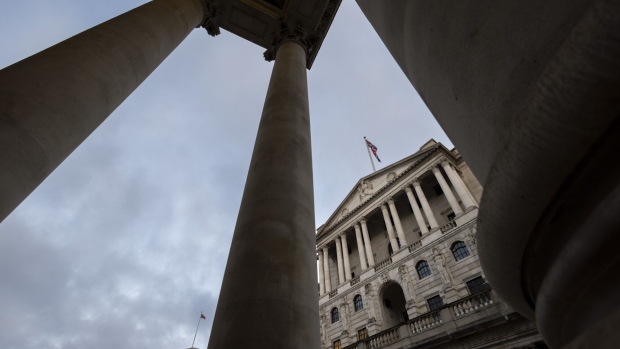Dec 6, 2023
BOE Sees More Risk in Hedge Fund Short Position in US Treasuries
, Bloomberg News

(Bloomberg) -- The Bank of England stepped up warnings about hedge funds shorting US Treasury futures, saying its measure of the net position is now larger than before the “dash for cash” crisis in March 2020.
The central bank said the net short position has grown to $800 billion from about $650 billion in July. That suggests a jump in the so-called basis trade, which is where investors seek to exploit price differences between futures and bonds.
The trade is particularly risky because returns are bolstered by borrowing money in the repo market. That tends to work well in a low-volatility environment but can backfire if the market moves fast — and can even disrupt the smooth functioning of the financial system.
“Sharp increases in volatility in market interest rates could lead to increases in margin required on the futures positions, or hedge funds may fund it harder to refinance their borrowing in the repo market,” the BOE said in a report Wednesday. “This, combined with any breaches of risk- or loss-limits, could force funds rapidly to unwind their positions.”
The BOE’s warning adds to a growing body of international regulatory concern. The UK central bank warned in July that the basis trade poses a risk to financial stability. The leveraged trade in US Treasury futures has regained popularity with hedge funds is attracting scrutiny from US regulators.
The report said the trade poses spillover risks to the UK because the same hedge funds are also active in the UK bond market, meaning a blowup in their US Treasuries could impact their gilt positions.
The message on the basis trade was part of the BOE’s broader warning about risks in market-based finance. Officials also said there “continues to be an urgent need to increase resilience” in that market, and pointed to the “opacity” and lack of frequent re-pricing of private credit assets. That increases their vulnerability to sharp and correlated falls in value, they said.
In the same report, the BOE said regulations to improve the liquidity positions of so-called liability-driven investment funds — at the heart of a gilt market blowup last year — had improved their resilience. The regulations require LDI funds to have enough cash to withstand a rise in bond yields of as much as 2.5 percentage points.
Still, it warned that some LDI funds were too slow to recapitalize their positions to reflect falling gilt prices. The expected response time is five days.
The BOE said it welcomed proposals currently under consultation to increase the resilience of UK money-market funds. Those would see their daily and weekly liquidity requirements rise to 15% and 50% respectively.
However, given that around 90% of sterling money-market funds’ assets are domiciled in the European Union and therefore not subject to UK regulation, the rules needs to be mirrored by other jurisdictions, the BOE said. That’s to avoid “regulatory arbitrage.”
(Adds BOE’s message on private credit in seventh paragraph.)
©2023 Bloomberg L.P.





